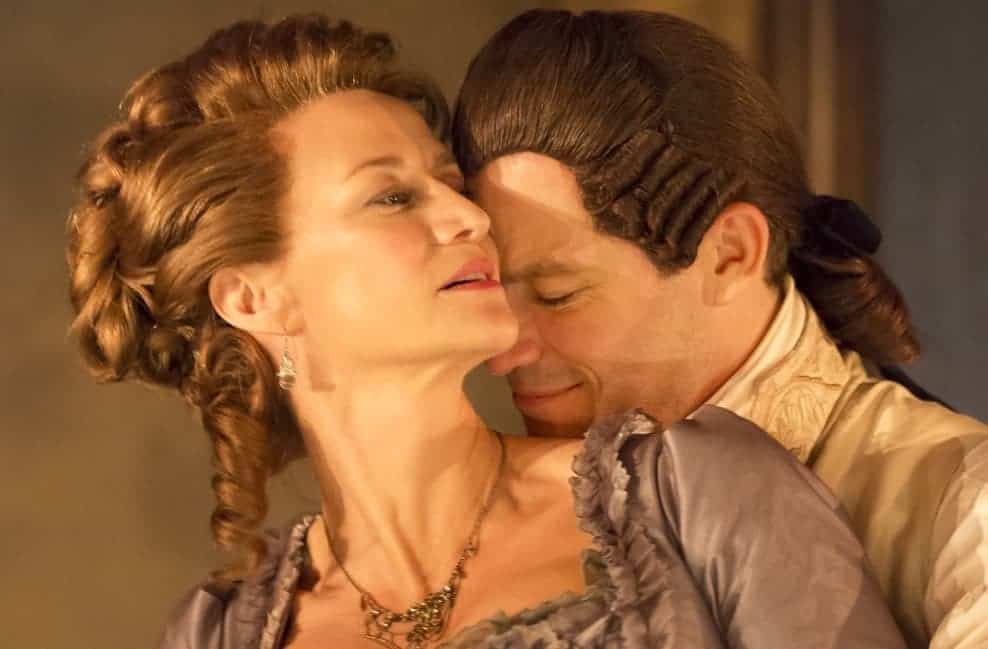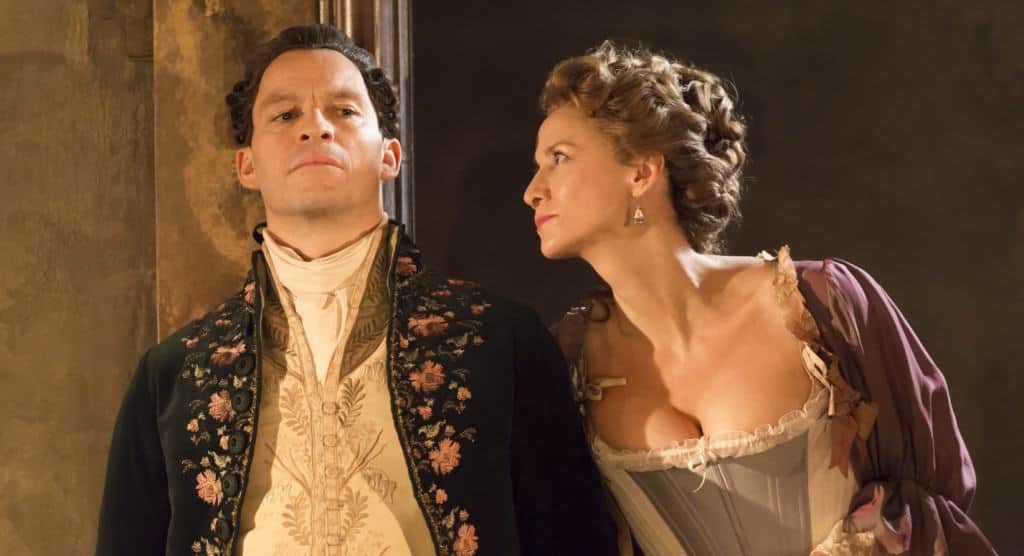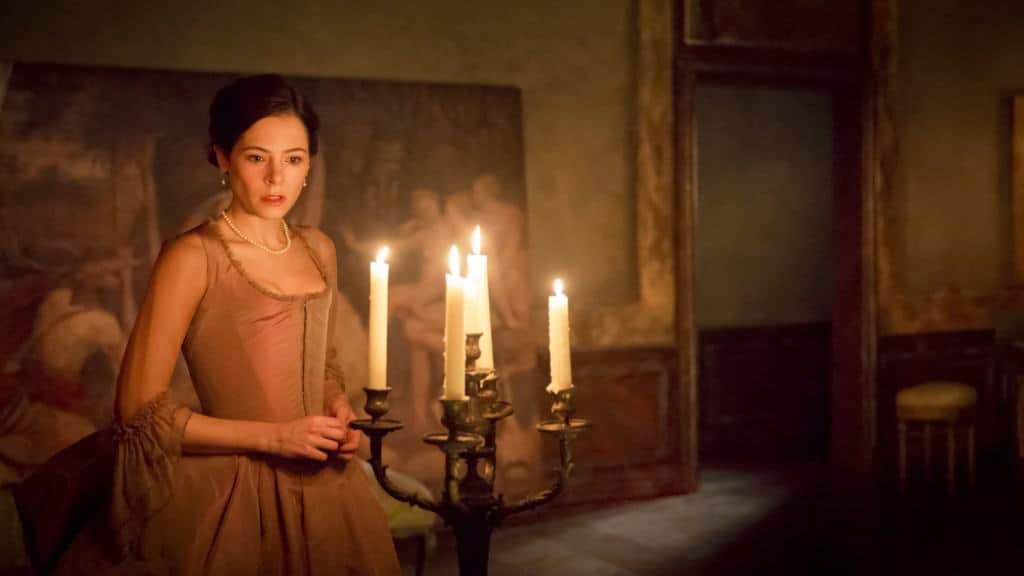Josie Rourke’s production plays up the novel’s feminist subtext while emphasizing the genuine bond between its two dissolute protagonists. The result is a surprisingly romantic take on this cynical novel.

As its creator boasted, Les Liaisons Dangereuses is a novel for the ages. Adapted for the stage by Christopher Hampton, it tells the tale of two consummate seducers who wield sex as a means to power. Josie Rourke’s production at the Donmar Warehouse Theatre plays up the novel’s feminist subtext while emphasizing the genuine bond between its two dissolute protagonists. The result is a surprisingly romantic take on this cynical novel.
Choderlos de Laclos’ 1792 novel may be the most misanthropic love story ever written. Its protagonists, the Marquise de la Merteuil (Janet McTeer) and the Vicomte de Valmont (Dominic West), are confidantes and former lovers whose only occupation is the calculated seduction and manipulation of innocents. Merteuil schemes to disgrace an ex-lover’s future bride, the airheaded Cecile (Morfydd Clark) while Valmont tries to seduce the virtuous Madame de Tourvel (Elaine Cassidy). All goes awry when Merteuil realises that Valmont genuinely loves Tourvel. Merteuil’s jealousy mounting, she and Valmont turn on one another, destroying themselves and everyone around them in the resulting conflagration.
Josie Rourke’s period staging is truly decadent: luxurious and reeking of moral decay. We open on a darkened stage, all the furniture covered in dust sheets. As the lights are raised, characters sweep away the furniture coverings and the stage comes to life, signalling that we are moving backward in time to an earlier era. Designer Tom Scutt’s sumptuous costumes and backdrops of classical paintings place us firmly in the eighteenth century, a delicate reminder that for these characters, seduction is genuinely dangerous. Death, disgrace, lifelong confinement: these are the very real consequences of an eighteenth-century love affair gone wrong. Scutt’s elegant designs are at once pleasing to the eye, and a hint at the grave risks these characters take in pursuit of pleasure.

Hampton and Rourke portray sex, and particularly infidelity, as an act of agency for women. Merteuil’s anger at Valmont is not just personal, but political: when he tries to intimidate her into bed with him, she hurls back that her hedonism is a form of freedom from male domination, so she’ll “thank [him] to take a less marital tone!” Cassidy’s portrayal of Tourvel, the virtuous woman Valmont intends to seduce, is especially interesting since it deviates considerably from the source material. Tourvel’s seduction is usually read as subjugation. Iin the novel, their first tryst is barely consensual, bordering on rape. But under Rourke’s direction, Tourvel seems liberated by the affair. She straddles Valmont and greets him half-clothed, displaying unalloyed joy without a hint of guilt. This makes it all the more poignant when Valmont’s waffling destroys both women
It takes great sensitivity to portray a character who is performing for everyone else, and Janet McTeer accomplishes it masterfully — though the same can’t be said for her co-star. McTeer delivers Merteuil’s lies with enough sincerity to take in those around her and enough subtlety to let us in on the game. Dominic West’s Valmont is less nuanced. West has Valmont’s smug masculinity down pat, but he never pulls off the feigned vulnerability that makes Valmont such a dangerous seducer. Valmont’s foremost weapon against Tourvel should be the appearance of weakness, which kindles her pity and then her love. But it’s hard to see how this macho Valmont could entrap Tourvel, since he comes off as a bad actor.
Rourke’s production portrays the relationship between Merteuil and Valmont as one of genuine affection. In their first scene together, they nuzzle and embrace, their gestures infused with familiarity and ardour. Though they’re ruthless and unprincipled, this Valmont and Merteuil clearly feel deeply for one another. Under Rourke’s direction, Valmont and Merteuil touch frequently and are clearly accustomed to inhabiting the same space – they’re comfortable and almost unguarded around each other, and honest about their own feelings. When Merteuil realizes that Valmont loves another woman, McTeer, alone on stage, openly weeps.

Laclos’ tale is susceptible to many interpretations, so it seems churlish to complain that Rourke’s reading doesn’t match my own. Yet I feel that Laclos would never have permitted his principals such warmth. Merteuil and Valmont are monsters warily circling each other, competing for emotional dominance through their private game. These two are practiced deceivers who are at their finest when manipulating one another. Their letters are more threatening than familiar: both acknowledge that their correspondence, as proof of their exploits, is a form of mutually assured destruction, since neither can expose the other without risking devastating retaliation. This undercurrent of hostility is absent from Rourke’s production.
Merteuil picks up where Medea leaves off: she’s a scorched-earth campaigner who pursues her revenge against Valmont though she knows it will be a pyrrhic victory. Valmont’s mistake throughout the story is in underestimating the women he’s dealing with. He’s overwhelmed by Tourvel’s goodness, and undone by Merteuil’s wounded rage. Indeed, this striking Merteuil may be the fatal flaw in Rourke’s production. Janet McTeer is so dynamic, and her character so witty and engaging, that nothing else on stage can live up to her.
Les Liaisons Dangereuses was broadcast to cinemas around the world by National Theatre Live. This review is based on the live recording of the production.

